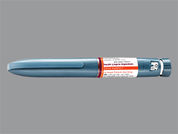Insulin Lispro Junior Kwikpen
Insulin Lispro
What is Insulin Lispro Junior Kwikpen used for?
Insulin lispro is used with a proper diet and exercise program to control high blood sugar in people with diabetes. Controlling high blood sugar helps prevent kidney damage, blindness, nerve problems, loss of limbs, and sexual function problems. Proper control of diabetes may also lessen your risk of a heart attack or stroke. Insulin lispro is a man-made product that is similar to human insulin. It replaces the insulin that your body would normally make. Insulin lispro starts working faster and lasts for a shorter time than regular insulin. It works by helping blood sugar (glucose) get into cells so your body can use it for energy. This medication is usually used with a medium- or long-acting insulin product. Insulin lispro may also be used with other oral diabetes medications (such as sulfonylureas like glyburide or glipizide).
CHEMICAL NAME
DRUG TYPE
DiabetesInsulin Lispro Junior Kwikpen Prices
Searching for the lowest prices
What does Insulin Lispro Junior Kwikpen look like?
View all Insulin Lispro Junior Kwikpen Image Information (2)Insulin Lispro Junior Kwikpen Frequently Asked Questions
Before using insulin lispro, tell your doctor or pharmacist if you are allergic to it; or to other insulins (such as insulin lispro-aabc); or if you have any other allergies. This product may contain inactive ingredients, which can cause allergic reactions or other problems. Talk to your pharmacist for more details.
Do not use this medication when you have low blood sugar (hypoglycemia).
Before using this medication, tell your doctor or pharmacist your medical history, especially of: kidney disease, liver disease, thyroid problems.
You may experience blurred vision, dizziness, or drowsiness due to extremely low or high blood sugar. Do not drive, use machinery, or do anything that needs alertness or clear vision until you can do it safely.
Limit alcohol while using this medication because it can increase your risk of developing low blood sugar.
It may be harder to control your blood sugar when your body is stressed (such as due to fever, infection, injury, or surgery). Consult your doctor because this may require a change in your treatment plan, medications, or blood sugar testing.
Before having surgery, tell your doctor or dentist about all the products you use (including prescription drugs, nonprescription drugs, and herbal products).
Check your blood sugar before and after exercise. You may need a snack beforehand.
If traveling across time zones, ask your doctor about how to adjust your insulin schedule. Take extra insulin and supplies with you.
Older adults may be more sensitive to the side effects of this drug, especially low blood sugar.
Children may be more sensitive to the side effects of this drug, especially low blood sugar.
Tell your doctor right away if you are pregnant. Pregnancy may cause or worsen diabetes. Discuss a plan with your doctor for managing your blood sugar while pregnant. Your doctor may change your diabetes treatment during your pregnancy (such as diet and medications including insulin).
This medication passes into breast milk, but is unlikely to harm a nursing infant. Consult your doctor before breastfeeding. Your insulin needs may change while breastfeeding.
IMPORTANT: HOW TO USE THIS INFORMATION: This is a summary and does NOT have all possible information about this product. This information does not assure that this product is safe, effective, or appropriate for you. This information is not individual medical advice and does not substitute for the advice of your health care professional. Always ask your health care professional for complete information about this product and your specific health needs.

